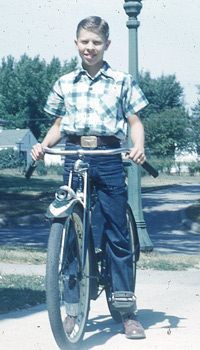 This past month, we completed our new book, The Five Keys to Powerful Business Relationships. As one of the book’s foundations, we interviewed over three dozen executives who were nominated by others for their ability to form powerful business relationships that largely to contributed to their success.
This past month, we completed our new book, The Five Keys to Powerful Business Relationships. As one of the book’s foundations, we interviewed over three dozen executives who were nominated by others for their ability to form powerful business relationships that largely to contributed to their success.
It wasn’t until after compiling their responses that we noticed an interesting trend: nearly a dozen of our gifted executives traced their focus on building powerful business relationships back to what they learned when delivering newspapers.
Naturally, we were curious to find out what skills these high-performing executives learned as paper carriers, whether or not they all inherently possessed them (“born with it”), and how those skills translated to building and managing powerful relationships in their roles today.
Here’s what they reported:
- Reliability – First, as paper carriers, they learned the importance of being reliable. With customers depending on them every single day, their ability to meet deadlines was critical. Every morning, they were responsible for walking or riding the same route at the same time and reaching their customers’ expectations – a dry paper delivered where they wanted it (on the sidewalk, or on the front porch, or near the mailbox, etc.).This skill was undoubtedly learned. Unreliable paper carriers were not paper carriers for long. Over time, the best paper carriers learned the nuances of their route, like processes and shortcuts that make their routes more efficient while keeping their customers happy. And when the customer needs were met on a consistent basis, carriers made more money.
- Problem-Solving – As paper carriers, they had to be competent enough to maintain a schedule and problem solve when issues arose. Customers didn’t want their paper delivered wet or ripped, so carriers learned the proper way to fold, wrap, carry and throw the papers.Outside factors, like interruptions in service (a customer on vacation) or delays in bulk delivery from the printer, forced our interviewees to think on their feet and manage customer expectations. If a newspaper was going to be late, carriers had to have a great track record with their customers and a great way of communicating why it was late.Again, this skill was overwhelmingly learned.
- Feedback – Most importantly, these paper carriers learned the value of keeping their customers happy and building strong relationships through ongoing interactions. Making strong relationships got them referrals. When they did a good job, the person next door may have stopped them and said ‘I need the paper too’ or ‘I heard you did a good job.’ To an aspiring business-person or leader, this feedback loop proved critical.
- Hands-On Customer Service – Lastly, paper carriers were solely responsible for collecting their subscribers’ monthly fees in person. Street by street, door by door, our carriers learned to be polite and persistent about asking customers for money. This hands-on approach to customer service also provided near real-time feedback regarding their performance.
The irony is that many of the executives we interviewed for our newest book don’t consider themselves masters at relationship building.
Often, they credit operational or technical competence for their success. Yet it became evident to us through the nomination process that their peers and employees see them differently: as powerful business relationship builders.
If this is the case, what lessons can we take away from their time spent as paper carriers? And how much more powerful can we become by mindfully learning and mastering these skills?






